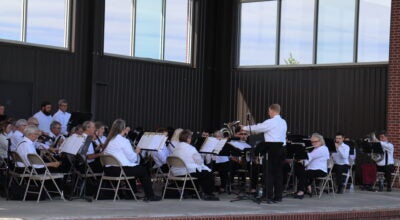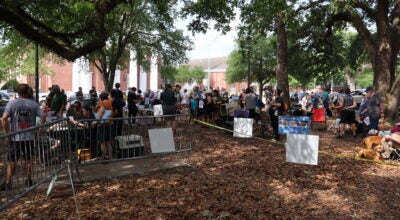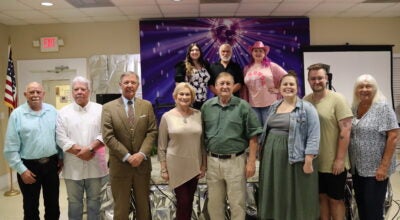MSU field day highlighted turf management practices
Published 4:24 pm Tuesday, October 5, 2021
By Bonnie Coblentz
MSU Extension Service
STARKVILLE, Miss. — A late September event at Mississippi State University testing grounds highlighted the significant attention turfgrass receives at the state’s leading research institution.
At the 2021 Turfgrass Research Field Day held at the MSU R.R. Foil Plant Science Research Center, participants got to examine new turfgrass varieties in development, look at the performance of several selections in a side-by-side variety trial and examine the results of weed control tests.
“The research MSU does is second to none,” said Wallace Sansing, owner of Sansing Sod Farm in Maben. “The experiments they do and the trials they conduct with a wide array of different herbicides give you good exposure to new herbicides that are coming available and let you know what works and what doesn’t.”
Jay McCurdy, an MSU Extension Service turfgrass specialist and associate professor in the MSU Department of Plant and Soil Sciences, organized the Sept. 23 event. More than 200 members of the industry participated in this field day hosted for the eighth consecutive year by MSU Extension.
“Last year forced us to move to an online format, but we were back this year with a great set of speakers and sponsors,” McCurdy said. “Our objective is to relay scientific discoveries to stakeholders in a practical way and to connect industry leaders and practitioners throughout the state and region. It is an opportunity to see new varieties in production, learn the latest research results and hear from experts.”
Turfgrass is a multimillion-dollar business in Mississippi. The industry includes everything from sod farms to installation, lawn care, golf course management and sports field maintenance.
MSU is a regional leader in developing new turfgrass varieties and controlling related problems such as weeds, diseases and insects.
“Much of the weed control work we’re demonstrating contains experimental compounds that are in development, and many of the combinations and general themes are reinforced by our research,” McCurdy said. “One of the major take-home points is that preemergence strategies for annual weeds work considerably better than postemergence treatments.”
While weed control in turfgrass is a major concern in certain sectors of the industry, sustainability is an even higher priority.
“Our Refuge Lawn project is exploring pollinator habitat inclusion within low-maintenance lawns,” McCurdy said. “In other projects, we’re evaluating native and natural grasses, which could be used to include wildlife habitat on golf courses. And my colleagues and I have several studies evaluating fertility management and other cultural practices.”
MSU researchers conducted more than 60 weed control trials in 2021. Fourteen were on display at the September event.
Will Arnett, director of golf and instructor at East Mississippi Community College Lion Hills Golf Course in Columbus, is a 1994 graduate of MSU who attends turfgrass field days to renew professional relationships and learn what is happening in the industry.
“I really believe in what Dr. McCurdy is doing in research that supports the turfgrass industry,” Arnett said. “I want to do everything I can to support him, support the program and network with other people.”
Barry Stewart, an associate professor in the Department of Plant and Soil Sciences described the different varieties MSU is testing as part of the National Turfgrass Evaluation Program — NTEP. Each are grown under very specific conditions and their performance is rated.
“Through NTEP, we have cultivars of seashore paspalum, St. Augustine grass, bermudagrass, tall fescue, zoysia grass and buffalo grass from companies and other universities being evaluated at MSU,” Stewart said. “We also are testing some seeded bermudagrasses for a seed company.”
MSU is one of just a handful of sites scattered across the country that participate in these evaluations.
Additionally, participants were able to see the six new varieties of bermudagrass and one new variety of St. Augustine grass MSU has under development and commercialization.
Hongxu Dong, assistant professor in the Department of Plant and Soil Sciences, said MSU holds one active patent for MSB-264 bermudagrass issued in 2013. The MSU-bred St. Augustine grass MSA 2-3-98 was patented in 2010 and has been planted on two Mississippi sod farms in the last two years, with commercial sales coming online in 2022.
“A second bermudagrass cultivar, MSB-285, which is a full sibling of MSB-264 was recently released by the Mississippi Agricultural and Forestry Experiment Station varietal release committee, and an official registration document is under preparation to be submitted to the Journal of Plant Registration,” Dong said.
Both of these selections were developed in collaboration between MSU and Sod Solutions. More bermudagrass cultivars are in development, and MSU experts hope to have a commercial bermudagrass release in 2022 or 2023 that supports the needs of stakeholders.
MSU has acquired a unique collection of bermudagrass plants from around the world.
“We recently assembled a panel of 206 bermudagrass germplasm accessions with worldwide origin, of which some were collected in temperate regions in the U.S.,” Dong said. “We are currently testing their adaptation in the field and characterizing morphological traits in the greenhouse. Crosses will be made between selected accessions to develop new hybrids.”
Find more information on MSU’s support of the turfgrass industry at http://extension.msstate.edu/l





